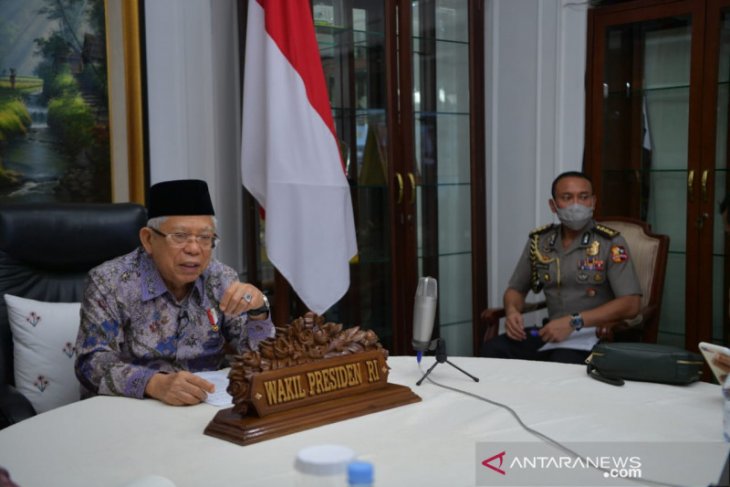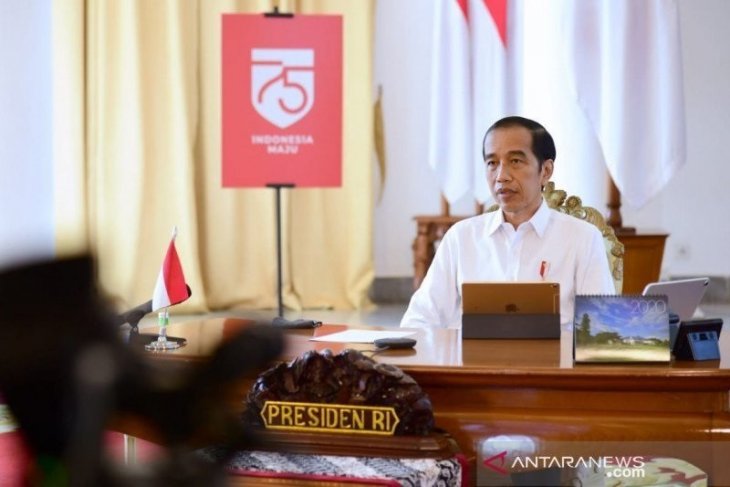Live Streaming
Program Highlight
Company Profile
August
Regional expansion is not primary answer to regions' problems: VP
Written by Ani Hasanah
Vice President Ma'ruf Amin at a teleconference with leaders of the Regional Representatives Council (DPD) in Jakarta on Wednesday (Aug 5, 2020). ANTARA/HO/Asdep KIP Setwapres
Vice President Ma'ruf Amin opined that the creation of new autonomous regions (DOB) is not the primary solution to the numerous problems faced by regions.
To this end, the government has yet to allow regional expansion as requested by some regions and focus on comprehensive implementation of the government policy, Amin remarked during a virtual meeting with the Regional Representatives Council (DPD).
"Regional expansion is not the only solution to the various problems in regions. Optimum implementation of the government’s policy that directly touches the public will become the solution for regional administrations," he noted in a statement here on Thursday.
Amin remarked that regional administrations should play their role, as representatives of the central government, to implement programs conceived in detail by the central government.
"For instance, the village fund program, stunting prevention program, insurance, and other social aid programs. Those are the alternative solutions," he pointed out.
At the meeting, Deputy DPD Chief Nono Sampono urged the vice president, as chairman of the Regional Autonomy Advisory Council (DPOD), to revoke the moratorium on regional expansion in a restrictive manner.
Sampono believes regional expansion should be permitted specifically for Papua and West Papua provinces and Kalimantan, particularly in the bordering area.
"Kalimantan, especially its bordering areas, has the same strategic position with Papua. Hence, we suggested limited expansion for Kalimantan, in addition to Papua and West Papua," he stated.
The government is still imposing a moratorium on regional expansion. It highlighted the need for comprehensive study and analysis in preparing for a regional expansion since huge sums of money, reaching some Rp300 billion, per district/municipality would be required for establishing a new autonomous region.
The Home Affairs Ministry noted that almost 80 percent of the budget for 514 districts/municipalities in Indonesia are sourced from the central government's budget. (ANTARA)
August
Violators of Health Protocols to Face Sanctions Under New Rules
Written by Ani Hasanah
President Joko Widodo has issued new instructions under which sanctions will be imposed on those individuals, businesses, and providers of public facilities and services who violate the health protocols. (ANTARA/HO-Kris-Secretariat of President)
President Joko Widodo has issued new instructions under which sanctions will be imposed on individuals, businesses, and providers of public facilities and services found flouting the health protocols promulgated in view of COVID-19.
The President signed the presidential instruction (Inpres) No. 6 of 2020 concerning the Improvement of Discipline and Law Enforcement of Health Protocols in the Prevention and Control of COVID-19 on August 4, 2020.
“The sanctions referred to (in the Inpres will be) in the form of: verbal or written reprimands, social work (community service), administrative fines, and suspension or temporary closure of business operations," as per a copy of the Inpres obtained here on Wednesday from the official website of the Ministry of State Secretariat.
The government has issued separate protocols for the protection of individuals and communities. The protocols for individual protection include using masks that cover the nose, mouth, and chin outside the house or while interacting with others whose health status is unknown; cleaning hands regularly; limiting physical interaction with others; and, increasing immunity by following Clean and Healthy Life Behavior (PHBS).
The health protocols for community protection include organizing campaigns and using information media to raise awareness and educate people about COVID-19 prevention and control, ensuring easy access to hand-washing facilities and soap, and providing hand sanitizers.
The rules also cover health screening and monitoring of all those who are active, measures to ensure physical distancing, cleaning of the environment periodically, maintaining discipline among people at COVID-19 risk, providing early detection facilities, and handling cases in anticipation of the spread of infections.
Under the new rules, the obligation to comply with the health protocols lies with individuals, businesses, managers, organizers, or those responsible for public places and facilities.
The public places and facilities covered by the Inpres are offices, businesses and industries, schools, places of worship, stations, terminals, ports, airports, public transportation, private vehicles, shops, modern and traditional markets, pharmacies and drug stores, food stalls, restaurants and cafes, street vendors, hotels, tourist attractions, health service facilities, and public areas and public places.
"Individuals, business actors, managers, organizers, or persons in charge of public places and facilities must facilitate the implementation of COVID-19 prevention and control (measures),” according to the presidential instruction.
Disciplinary enforcement of the health protocols has been further laid down in the regulations of governors, district heads, or mayors. According to the Inpres, in drafting regional regulations, administrations must pay attention and adjust to the local wisdom of each region.
The presidential instruction also regulates dissemination of information or educational material on prevention and control of COVID-19 by involving the community, religious leaders, traditional leaders, community leaders, and other elements of society. (ANTARA)
Indonesia and the United Kingdom Sign MoU on Science and Technology
Written by Ani HasanahJakarta (VOI News) - The Indonesian and British governments have agreed to extend partnerships in the field of science and technology until 2025 in a bid to support collaboration of researchers to improve the welfare of people in both countries. The continuation of the UK-Indonesia’s partnership was marked by the signing of Memorandum of Understanding (MoU) held by Minister of Research and Technology / Head of the National Research and Innovation Agency, Bambang Brodjonegoro and British Minister for Science, Research and Innovation, Amanda Solloway MP. In a webinar meeting held on Wednesday (05/08), Minister Bambang Brodjonegoro stated that the signing of the MOU can be a momentum to become more productive in working and providing solutions for global problems.
"This Memorandum of Understanding (MoU) will be a legal umbrella for the implementation of research and innovation collaboration conducted by research institutions and universities. Indonesia hopes that this cooperation can be used as a momentum to be more productive in working and providing solutions for international problems. We are so happy to hear that the cooperation between the two countries has produced more than 2,200 international publications during the 2015-2019 period. In the future, Indonesia targets that the number of publications will increase and there will be joint innovations that the two countries can produce," said Bambang Brodjonegoro.
Moreover, Minister Bambang Brodjonegoro also stated that Indonesia is committed to developing domestic innovation capabilities and increasing research and development in supporting economic growth. The Newton Fund partnership has succeeded in increasing research and innovation collaboration in recent years that has also provided benefit for Indonesia and the UK. The Newton Fund collaboration model will be used as an example in the application of other international science partnerships. The extension of partnerships in science and innovation in the long term will improve Indonesia's capabilities to develop a knowledge-based economy and be able to compete in the global market. On the same occasion, British Ambassador to Indonesia, Owen Jenkins stated that there are still many things that can be done to advance the collaboration based on the MoU for research and innovation. The next step is to encourage the commercialization of the research that has been carried out and how to make the research products in order to give benefit to people. (VOI/NK-Trans by AF)
August
Indonesian FM Extends Condolences to Families of Beirut Blast Victims
Written by Ani Hasanah
Beirut explosion on Tuesday, Aug 4, 2020. (Antara Lampung/screenshot
Indonesian Foreign Affairs Minister Retno Marsudi offered her condolences and sympathies to the families of the victims of the explosion that rocked Beirut in Lebanon on Tuesday evening.
"My deepest condolences and sympathies go out to the families, people, and Government of Lebanon following the massive explosion in Beirut that resulted in the loss of lives and left thousands injured," Marsudi wrote on her Twitter account on Wednesday.
The minister affirmed that Indonesia was standing in solidarity with the people of Lebanon at this time of grief.
A powerful blast in port warehouses near central Beirut storing highly explosive material killed 78 people, injured nearly four thousand, and sent seismic shockwaves that shattered windows, smashed masonry, and shook the ground across the Lebanese capital, Reuters reported. The death toll was expected to increase further, as emergency workers rummage through the rubble in search of survivors.
The cause of the explosion was not immediately known, but the government linked the blast to some 2,750 tons of confiscated ammonium nitrate stored in a warehouse at the port for six years.
An Indonesian national suffered minor injuries and was in a stable condition following the explosion in the Port of Beirut, according to the Indonesian Embassy in Lebanon.
The embassy's records point to the presence of 1,447 Indonesian citizens in Lebanon, including 1,234 members of the Indonesian Peacekeeping Garuda Contingent and 213 students as well as diplomats, the embassy's staff and families.
All of them were safe, the embassy noted in a statement. (ANTARA)



